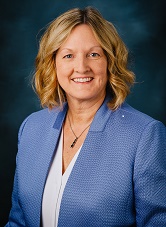Annalee R. Ward, Ph.D.
Guest Columnist
Annalee Ward, Professor of Communication, currently serves as the Director of the Wendt Character Initiative at the University of Dubuque. This Initiative promotes excellent moral character and lives of purpose. Passionate about interweaving faith, life, and learning, Annalee is grateful for the work of the Christianity and Communication Studies Network whose work illustrates these interests.
Let us hold unswervingly to the hope we profess, for he who promised is faithful. And let us consider how we may spur one another on toward love and good deeds. Hebrews 10:24-25
Our vocabulary strains to name these unknown days of sheltering at home, social distancing, quarantine. Uncertainty and niggling anxiety, existential dread—whatever we call it, we’re hounded by an underlying feeling that often blooms in the dark of night daring us to try to sleep. Here we are, waiting. Waiting for the virus to hit or pass us by. Waiting for healing. Waiting to see our loved ones. Waiting for routines to return. Can anything good come of this?
Anthropologist Arnold Van Gannep and later Victor Turner studied rituals and rites of passage and named the transitional state, the “betwixt and between” as liminality. This transitional state disorients, encouraging us to leave the past while offering hope of transformation to something better. One thing is certain in liminality, however, one does not exit this experience as the same person. Change occurs—perhaps a vision of something better, perhaps a recognition of something we would rather leave behind.
It is fitting that the pandemic hit at the particular time of year in the church calendar of Lent and Easter. The season of Lent culminated in a week of in-betweenness with reflection on how suffering grows and leads to death. After Easter, Christ followers continue living in the already of Christ’s salvific work and the not yet of his return. We celebrated Easter as the reality of a living Christ, but also of one who promises his full reign is yet to come.
The country, even the world, has been living in the hard to bear liminal state. Will this be a threshold to positive change? We have seen the creation of communitas or an experience of communion/community so characteristic of liminality. The spirit of comradeship has grown. We’re all in this together. We all need to work together to flatten the curve, to help provide protective gear, to run errands for those who shouldn’t go out, to connect to family and loved ones.
And in the middle of the horror of the disease, stories emerge of kindness, of service, and of hope. Perhaps we are all discovering a better priority of values. Perhaps we will emerge as people of character, people who have known suffering and who rejoice in hope. In the meantime, don’t hesitate to embrace the opportunity to change.
I leave this with poet Mary Oliver’s prose poem that aptly speaks into our experience.
Don’t Hesitate
If you suddenly and unexpectedly feel joy, don’t hesitate. Give in to it. There are plenty of lives and whole towns destroyed or about to be. We are not wise, and not very often kind. And much can never be redeemed. Still, life has some possibility left. Perhaps this is its way of fighting back, that sometimes something happens better than all the riches or power in the world. It could be anything, be very likely you notice it in the instant when love begins. Anyway, that’s often the case. Anyway, whatever it is, don’t be afraid of its plenty. Joy is not made to be a crumb. Swan: Poems and Prose Poems

